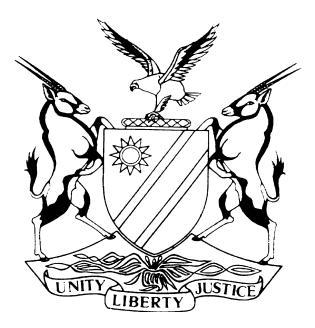3
REPUBLIC OF NAMIBIA

IN THE HIGH COURT OF NAMIBIA, MAIN DIVISION, WINDHOEK
REVIEW JUDGMENT
PRACTICE DIRECTIVE 61
Case Title: The State v Simasiku Charles Kauhano | Case No: CR 114/2023 | |
High Court MD Review No:1564/2023 | Division of Court: High Court, Main Division | |
Coram: Liebenberg J et Shivute J | Delivered: 3 November 2023 | |
Neutral citation: S v Kauhano (CR 114-2023) [2023] NAHCMD 704 (3 November 2023) | ||
ORDER: The conviction and sentence on count 1 are set aside. The matter is remitted to the trial court in terms of s 312 with the direction to question the accused in terms of s 112(1)(b) of the Criminal Procedure Act 51 of 1977 in order to cover all the essential elements of the offence charged and to bring proceedings to its natural conclusion. | ||
REASONS: | ||
LIEBENBERG J (SHIVUTE J concurring): [1] Before court is a review from the Magistrate’s Court of Katima Mulilo where the accused stood charged with a contravention of s 82(5)(a) read with sections 1, 82(6), 82(7), 86,89(1) and 89(4) of the Road Traffic and Transport Act 22 of 1999 (the Act) – Driving with an excessive breath alcohol level, amongst other charges. This review relates only to the charge as aforementioned. [2] The accused pleaded guilty and was convicted on his guilty plea in terms of s 112(1)(b) of the Criminal Procedure Act 51 of 1977 as amended (the CPA). He was sentenced to N$5000 or 5 months’ imprisonment. It was further ordered that the accused is prohibited from obtaining a driver’s licence for a period of five (5) months. [3] On review, a query was directed to the court a quo in which the magistrate was asked to explain what satisfied the court that the breath alcohol specimen was taken within the prescribed period. [4] The magistrate’s response was in the form of a concession to his error and rightly asks that the conviction and sentence be set aside and the matter remitted to it for compliance with the law. [5] The provisions of s 82(6) of the Act provide that: ‘If, in any prosecution for a contravention of subsection (5), it is proved that the concentration of alcohol in any specimen of breath of the person concerned exceeded 0,37 milligrams per 1 000 millilitres of breath taken at any time within two hours after the alleged offence, it shall be presumed, in the absence of evidence to the contrary, that such concentration exceeded 0,37 milligrams per 1 000 millilitres at the time of the alleged offence.’ (Emphasis provided) [6] It is evident from s 82(6) of the Act that to be valid, a breath specimen must be taken from an accused within two hours of the commission of the offence. The record reflects that during questioning in terms of s 112(1)(b) of the CPA, the accused indicated that he was arrested in the evening. Apart from the date on which the arrest took place, the accused’s answers do not specify the time the specimen was taken. A reading of the record, however, suggests that the specimen was taken at 14h20, which is evident from the Breath Alcohol Analysis Record receipt. Nothing much turns on this as the record of proceedings indicates the accused’s admissions as being that the arrest took place in the evening, which leaves more questions than answers owing to the discrepancy. There is no indication during the s 112(1)(b) questioning that the breath specimen was taken within the prescribed two hours as this element was not established. [7] The court a quo failed to ask the accused whether the breath specimen was taken within two hours after the incident, a crucial element which, by its omission, clearly taints the conviction imposed. The accused should thus not have been convicted, as not all the elements of the offence were admitted. The conviction and, consequently, the sentence, fall to be set aside. [8] In the result, the following order is made: The conviction and sentence on count 1 are set aside. The matter is remitted to the trial court in terms of s 312 with the direction to question the accused in terms of s 112(1)(b) of the Criminal Procedure Act 51 of 1977 in order to cover all the essential elements of the offence charged and to bring proceedings to its natural conclusion. | ||
J C LIEBENBERG JUDGE | N N SHIVUTE JUDGE | |